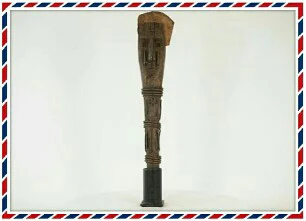OFOR HOLDERS AND THE IGBO NATIVES
Cultures in itself can be described or viewed, as people way of life, including the language they speaks, food, fashion line or styles etc. ‘Ofor’, before now, or even recently, especially personal or individual ofor, which is used by titiled men in the lgbo traditional communities, here it is a symbol of social glamour, achievements and also is a fashion accessories thats complements lgbo traditional and cultural clothing outfits, dressings etc.
It funtions as a staff of office in the traditional and cultural lgbo nationality . ‘’ofor is an ancestral staff or mace of authority that is handed over from son to another son, and from generation to generation’’ ( Maduabuchi.D). In the lgbo traditional belief system, ofor has forms, there is an individual ofor holder, as earlier mentioned above, personal ofor and there is a popular saying, concerning ofor that goes this way’, ‘’onye obu la si na ya ji ‘ofor’, ma so ‘ofor’ ma onye ji ya (Sir, warrior and the oriental brothers) affirming lgbo adage’, reasons because their is some cultural responsibility attached to those holding ofor. ‘’Ofo is like the Bibile, you do not carry it carelessly'' (Anekwe) wall Street Journal.
There is other types of ofor, family ofor, kindred, lineage (ofor Umunna) and general community ofor, which the later often regarded as ofor ala obodo, and the bearer, most time it is the oldest man from the family, kindred and the clan as the case may be, that has the right to bear it. It also serves as an age determinant in the community respectively. The family ofor is usually for prayers, decision making and communicating to the ancestors and so on by the holder.
While the community ‘ofor’, is used to appease the gods, when somebody desecrates the land, it is also used as means of communication prayer by the bearer, to their ancestors, for the peace and the progress, that is peaceful development of individual of the said community. In the traditional lgbo cultural belief system, ‘ofor symbolized, uprightness, justice, truthfulness, righteousness, fairness and the defender of the innocents etc. Any body holding ofor is expected to handle it, with an out-most care, both in professing and its use. ‘Ofor’, is a sacred material instruments of blessings, santification as well as purification of the home, family and land, Its also protects.
Bibilically Moses used, his own ‘staff’’, when he was instructed by God, to lead his people out of the land of their sojourner and lead, them to their promise land. There are other forms of ofor used religiously, like the one that represent the deities, use by native doctors, diviners, spiritualist and priest etc, it is used here as a sacred intrucments of prayers or worship. Ofor that is used adversely, (negatively) has its repercussions, such as removal of the ofor from the holder etc. Since the era of colonization and the embracement of christianity by the people, they are now shying away from the original ofor made from Detarium Elastica tree (osisi ohoo) by Isukwuato people.
Therefore by the lgbo’s and for the lgbo traditional belief system, ofor’, is an image of uprightness, fairness, righteousness and truthfulness in reference to the Ultimate Reality God.
Ajuju a na juzi wee buru, gi bu onye ji ofor, ma o bu onye enye fere ofor na aka, ina edowo kwa iwu ma obu nso ofor iji ?.
(1). Kola Nut And The lgbo People.
(2). Okwa-Oji Na Ndu N'di Igbo.
(3). Preservation Of The lgbo Kola Nut.
(4). Igbo Kola Nut Cotiledon.
(5). What The lgbo Kola Nut Forbids.
(6). Breaking The lgbo Kola Nut By...
(7). Ofor Holders And The lgbo Natives.
(8). Ise affirmations ln The Traditional..
(9). The Ogirisi Symbol And lgbo People.
(10). Palm Tree And lts People.
(11). KingShip Coronation ln Africa.
(12). How To Prepare Okra Soup And...
(13). Eating Of The Kola-Nut.
Email: anyison100@gmail.com
Ifeanyiikwulagu






Comments